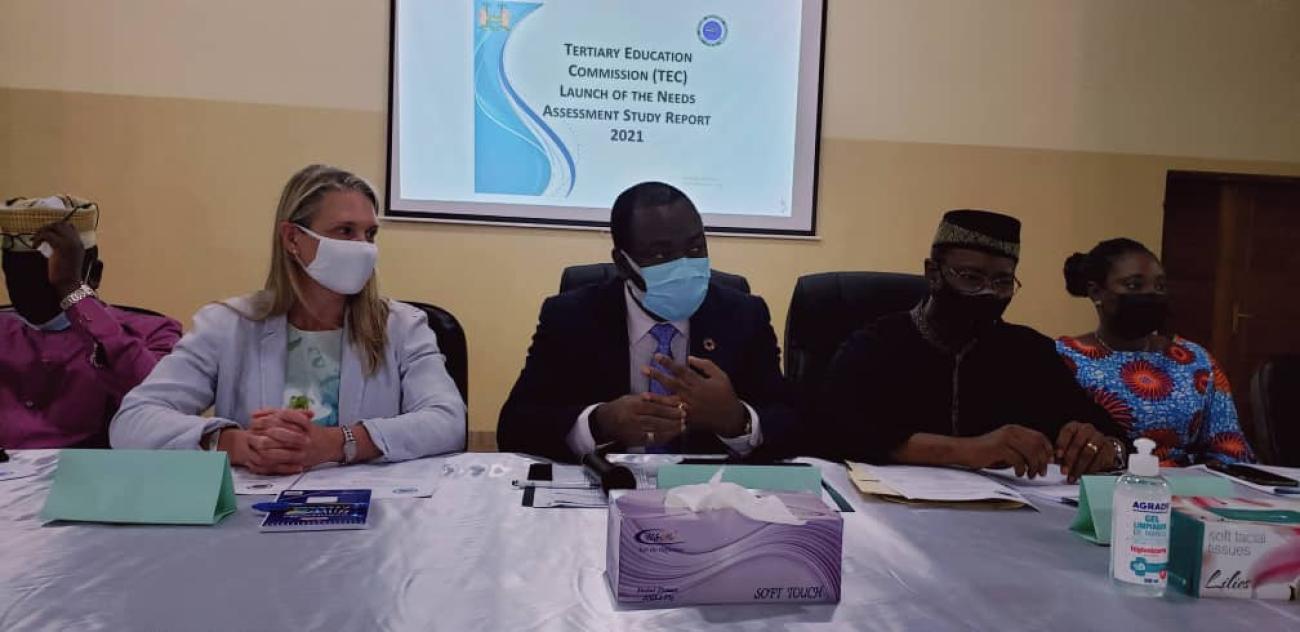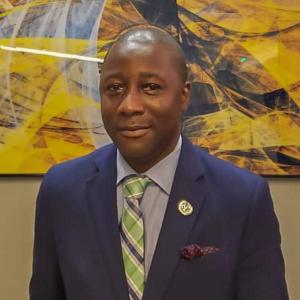The UN Resident Coordinator in Sierra Leone Mr Babatunde Ahonsi last Thursday emphasised the importance of the launching of the National Needs Assessment survey report on higher education institutions, describing it as "a call to action to all stakeholders for the transformation of the higher education sector".
Speaking at the launch organized by the Tertiary Education Commission at the Milton Margai College of Education, Goderich, Mr Ahonsi said he was delighted by the opportunity the event presents to put higher education squarely on the development and public policy agenda in Sierra Leone, as outlined in the Medium-Term National Development Plan.
Mr Ahonsi indicated that he saw the need for a public discourse on higher education and its impact on economic development, social transformation, and national integration. He also emphasized the need for mass media to highlight the linkages between higher education and sustainable development, "given that we live in an increasingly competitive knowledge-based global economy." To this end, he mobilized development partners in collaboration with the Tertiary Education Commission and the Ministry of Technical and Higher Education.
Mr Ahonsi described the report as a rich mine of data, with insights on the state of higher education institutions in the country and recommendations for moving the sector forward. He encouraged all to read the report.
In his welcome remarks, Tertiary Education Commission Chair Professor Aliyageen Mohamed Alghali said, as the body responsible for quality assurance, the Commission assesses the status of the accredited tertiary education institutions in fulfilment of its statutory mandate. Hence, the raison d'etre for the report launched that day. He further noted that the report is the result of a comprehensive collection, recording and analysis of data provided by survey participants in the various accredited Higher Education Institutions.
Professor Alghali also sought the support of the relevant partners for social and economic development in Sierra Leone to transform the delivery of higher education in the country in conformity to the demands of the technological and socio-economic challenges of the twenty-first century.
In her statement, the British High Commissioner to Sierra Leone, Ms Lisa Chesney, said support for improved quality and equitable access to education, especially for women and girls is an important UK foreign policy priority. This, according to her, was demonstrated earlier this year by the successful visit to Sierra Leone by the UK Prime Minister’s Special Envoy for Girls' Education – the Right Hon. Helen Grant MP.
Making a statement on behalf of the Embassy of Ireland, the Deputy Head of Mission, Ms Emma McLoughlin, reaffirmed her country's commitment to partnership with Sierra Leone in education, which is formalised in their five-year Mission Strategy.
"We have been delighted, together with other development partners, to support the Free Quality Education Programme through the Multi-Donor Trust Fund as led by the World Bank. This will benefit over two million students across primary and secondary schools and over 9,000 teachers. We look forward to maintaining this commitment to 2024," Ms McLuoghlin said.
She ended by saying that Ireland is delighted to offer the Ireland-Africa Fellowship programme for early-career professionals in areas related to the SDGs, recognising the potential for young Sierra Leoneans to be future leaders in their fields.
The World Bank Country Manager, Mr Abdou Muwonge, in his statement, said that his institution has been working on TEVT (technical and vocational education and training) sector with the Ministry to build the foundation for demand-led skills development system in the country. "We are keen to extend our support to higher education and I look forward to joining further discussions with you all on how to strengthen the higher education system in the country," he underlined.
Statements of commitment to the sector were also made by the European Union, GIZ and the Parliamentary Oversight Committee on Technical and Higher Education, Ministry of Finance
In his keynote address, the Minister of Technical and Higher Education, Professor Alpha Wurie, described the report as impressive. He said the conduct of the survey was based “on the conviction that unless we have a clear knowledge and understanding of what we have in the higher education institutions, it will be difficult to make decisive allocation of resources to address urgent priorities."
Before the official launching of the report by the Minister, presentations were made on the four clusters captured in the survey. A plan of action was also presented at the event. The programme was ended by four panel sessions to discuss improvements to higher education.



